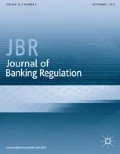REFERENCES AND NOTES
Talbot, L.E. (2009) Of insane forms: From collectives to management controlled organisations to shareholder value organisation: Building societies: A case study. Journal of Banking Regulation 11 (3): 223–239.
Corporate Governance after the Financial Crisis, p. 20.
Corporate Governance after the Financial Crisis, Chapter 1.
Corporate Governance after the Financial Crisis, p. 32.
Corporate Governance after the Financial Crisis, p. 43.
Talbot, L.E. (2013) Why shareholders shouldn’t vote: A Marxist-progressive critique of shareholder empowerment. Modern Law Review 76 (5): 791–816.
http://www.bbc.co.uk/news/business-18407587, 12 June 2012 Robert Peston.
Hansmann, H. and Kraakman, R. (2001) The end of history of corporate law. Georgetown Law Journal 89 (2): 387–440.
Corporate Governance after the Financial Crisis, p. 49.
There was a political outcome of the Bubble Act rather than a legal one. Charters could be granted but the parliament was vary of doing so.
Although it should be noted that they did not take a strong stand until the C19th beginning with Rex v. Dodd in 1808.
Burnes v. Purnell (1849) 2 HL Cas 497.
Corporate Governance after the Financial Crisis, p. 56.
Corporate Governance after the Financial Crisis, p. 58.
As in the UK Companies Act 2006 sections 171–177.
In contrast, in the United Kingdom, the Takeover Code states that managers may only do so with the permission of shareholders.
Corporate Governance after the Financial Crisis, p. 74.
Corporate Governance after the Financial Crisis, p. 73.
Corporate Governance after the Financial Crisis, p. 75.
Corporate Governance after the Financial Crisis, p. 77.
Corporate Governance after the Financial Crisis, p. 86.
Corporate Governance after the Financial Crisis, p. 92.
India is currently debating whether to include mandatory CSR in its companies legislation. For an analysis of this see Caroline Van Zile (2012) India's mandatory corporate social responsibility proposal: Creative capitalism meets creative regulation in the global market. Asian-Pacific Law & Policy Journal 13 (2): 269.
Corporate Governance after the Financial Crisis, p. 95.
Just months after its publication Enron collapsed.
Kraakman and Hansmann N9.
Corporate Governance after the Financial Crisis, p. 101.
Revlon Inc v. MacAndrews & Forbes Holdings Inc (1986), 506 A(2d) 173 (Del SC) this case slightly modified the more destructive approach taken in Unicol Corp v. Mesa Petroleum Co (1985), which upheld the directors attempts to frustrate a hostile takeover bid as their duty was to protect the organisation.
Paramount Communications Inc v. Time Inc (1989), 571 A (2d) 1140 (Del SC).
Paramount Communications Inc v. QVC Network Inc (1994), 637 A (2d) 34 (Del SC).
Corporate Governance after the Financial Crisis, p. 124.
Corporate Governance after the Financial Crisis, p. 140.
Corporate Governance after the Financial Crisis, p. 141.
Corporate Governance after the Financial Crisis, p. 152.
Blockholders.
Corporate Governance after the Financial Crisis, p. 214.
Corporate Governance after the Financial Crisis, p. 212.
Corporate Governance after the Financial Crisis, p. 215.
Corporate Governance after the Financial Crisis, pp. 215–216.
Corporate Governance after the Financial Crisis, p. 217.
F Fukyamo places great emphasis on the importance of trust in business relations as the foundation of good capitalist development, citing ‘high-trust’ societies (the United States, Germany, Japan) and ‘low-trust’ societies (Italy, France, Korea, Taiwan). The Social Virtues and the Creation of Prosperity (London: Penguin 1995).
The Pengurusan Damaharta Nasional Berhad Act 1998, cited on p. 237.
Although the paper made no reference to the Companies Act 2006 (UK).
Corporate Governance after the Financial Crisis, p. 254.
Corporate Governance after the Financial Crisis, p. 274.
Corporate Governance after the Financial Crisis, p. 272.
Author information
Authors and Affiliations
Rights and permissions
About this article
Cite this article
Talbot, L. An opportunity for a stakeholder's corporation? A review of Corporate Governance after the Financial Crisis. J Bank Regul 15, 184–195 (2014). https://doi.org/10.1057/jbr.2013.3
Published:
Issue Date:
DOI: https://doi.org/10.1057/jbr.2013.3

